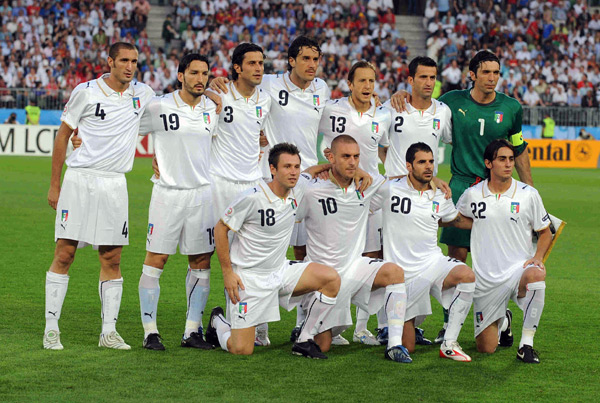
Italy is a country ruled by old men (over 50). The economy, the government, and, yes, the football system too. This gerontocratic culture of power is crucial to understanding why the Azzurri performed so horribly in the Confederations Cup in South Africa.
Aging world champions like Cannavaro (age 35), Toni (32), Zambrotta (32), Camoranesi (32), and Gattuso (31) lacked the enterprise, motivation, and physical attributes necessary to compete at this level. New blood is badly needed. But only New Jersey-born Giuseppe Rossi (22) was given enough playing time. Compare this inclination to avoid youthful vigor and imagination to the story of Lionel Messi — a regular for Barcelona and Argentina since age 17 and 18 respectively.
Serie A does have promising young talents. The current success of the Under-21 side is proof of that. The following men are ready for the big time: Motta and Santon in defense; Cigarini, Marchisio, and Giovinco in midfield, Acquafresca and Balotelli up front. There are others too, such as De Ceglie, Brighi, and maybe even Cassano.
Italian manager, Marcello Lippi, argues he cannot rely too much on young players because international matches require “experience.” Of course, this is true, but fresh legs, inspirational leadership, and hunger to win are also necessary. Buffon, Chiellini, and De Rossi can be the basis for reconstruction and perhaps returning the Azzurri to former glories. But it may be too late for 2010.
Italian football has fallen into this trap before. In the 1978 World Cup in Argentina (the junta’s apotheosis), Enzo Bearzot was brave and smart enough to start several young players: Cabrini (age 20), Scirea (25), Tardelli (23), Antognoni (24), and Rossi (21). The Azzurri finished a very respectable fourth. In 1982, fortified by their previous experience, the same core group won the World Cup. Yet, Bearzot, like Lippi, stayed with his “vecchietti” too long.
And his side failed to qualify for Euro 1984, a campaign that closed with humiliating 0-3 defeat to Sweden in Naples. Bearzot belatedly tried to address the team’s shortcomings, but lost curtly to France (0-2) in the round of sixteen of the 1986 World Cup. The end of an era.
Italians ignore their (football) history at their own peril.
Categories
2 replies on “The end of an era for Italy”
It is beyond frustrating to see the Azzurri make the same mistakes as in the past. And to make things worse, the U-21 and the players in their mid-20’s are DOMINATING Italian soccer unlike their predecessors. There’s no one who knows Italian soccer who is not excited, in real, concrete terms, about the explosiveness of emerging Italian soccer players.
Alegi is wrong for not being crazy about Cassano, who has a way with the ball that Bruno Conti could only dream of. He is right, of course, in mentioning the great Antognoni.
I agree with Alegi’s assessment, but view it as a problem not only for the Azzuri, but for any team which has been hugely successful in the past… For example, Germany made the same mistake in the 1990s after winning the world cup in 1990… Playing Matthaeus for another two world cups in 1994 and 1998 and in the Eurocup in 2000 was just too much love for long-gone glory… Germany exited both worldcups in the quarterfinals, the worst results produced by a German team since 1978, and the Eurocup 2000 in the group stages. It seems as if football teams, just like any enterprise, need a sound balance between a learning- and performance orientation. This is something that most knowledge-intensive companies are very-well aware of… But something that football coaches all too often forget… Young players and the team as a whole need to be developed, just as companies invest in new product and technologies before they can be taken to the market and realize profits… Giving teams the time to learn and develop allows them to realize their full potential – and there is certainly no lack of potential on the Italian side.